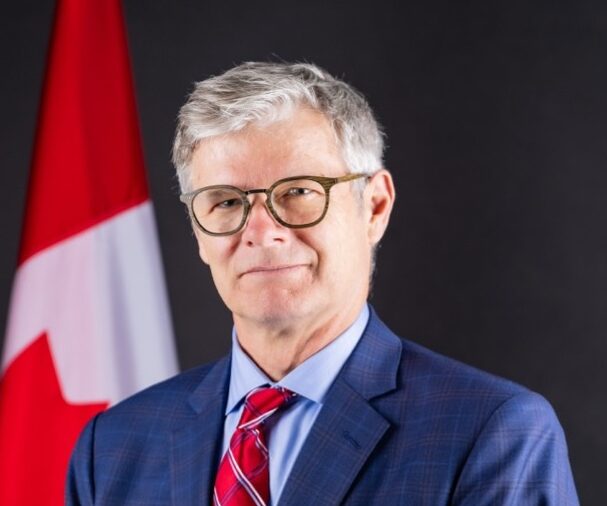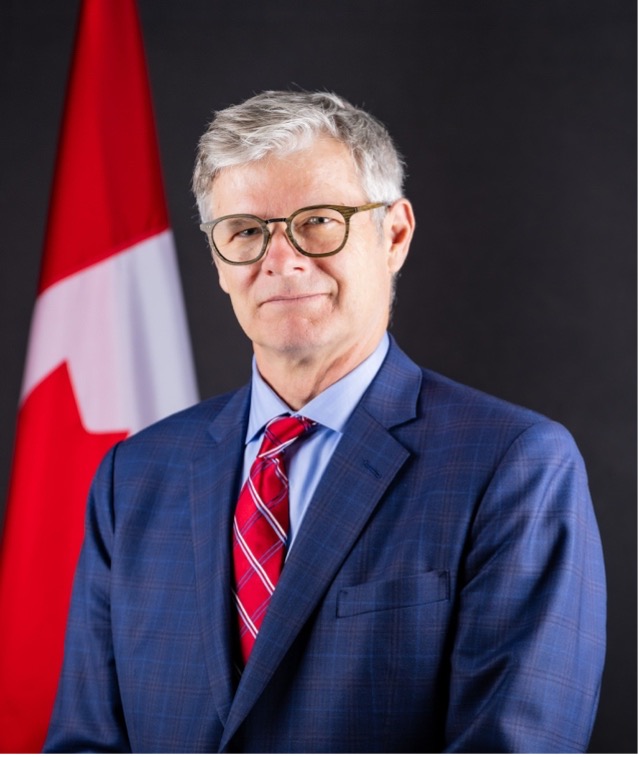A conversation with Allen Sutherland, IOG’s new President and CEO

By Rhonda Moore
July 3, 2025
On 19 June, IOG announced Allen Sutherland would become the new President and CEO of the Institute on Governance. For those not already familiar with Allen Sutherland, you might be wishing you knew a bit more about him, what makes him tick, and where might the IOG be headed under his leadership? We sat down together on 23 June for a quick chat on these exact topics.

Q: Allen, you had a rewarding and successful 38-year career with the public service. What prompted a second career at the IOG?
“Let me put it squarely in governance terms. The quintessential expression of Canadian democratic governance is contained in Section 91 of the British North America Act – the famous POGG (peace, order and good government) reference. In practice, good government (or governance) creates the conditions for enduring peace, order (and also prosperity and well-being). This is central to the Canadian success story and will also be key to our success going forward. What excites me about joining the IOG team is that the Institute addresses “good government” in three ways:
- Good government requires knowledge. It requires an understanding of leading practices and the traditions of our Westminster system. This means continual transmission of corporate knowledge and what works to succeeding generations of public servants, whether they formally work for the different levels of government or whether they contribute to the public good from other sectors including the political sector, private sector, civil society, academia etc.
- Providing expert governance advice on difficult public policy challenges has been the focus of my career. The IOG also provides expert governance advice, drawing on deep expertise to crunch the wicked problems of today.
- Convening and Thought Leadership is a natural for a policy wonk like me. The idea of bringing leading practitioners and thinkers together to examine emerging challenges, like AI or the integration of sometimes evolving scientific knowledge into public policy solutions is another exciting area where the IOG makes a difference.”
Q: In your opinion, what are the most pressing governance issues facing contemporary Canada?
“There are many directions to take this question. Current European discourse seems to focus on polycrisis or cascading crises where societies are forced to grapple with multiple urgent crises simultaneously. Think in terms of climate change, geo-political crisis sparked by the Russian invasion of the Ukraine and stagnant economies; a related challenge and complicating factor is coping with discontinuity, whether economic – as when whole sectors find their comparative advantages evaporating or perhaps the stagnant productivity – or social as has been seen on the pressures facing different portions of the population.
“For Canada today, a central challenge is to meet the moment, including discontinuous developments or even polycrisis, without losing our sense of ourselves and without sacrificing unity of purpose. Part of that comes back to ensuring effective governance so that there is continued trust in the Canadian model.”
Q: What is IOG’s role in this response?
“IOG will focus on the governance dimension of issues and our areas of unique contribution in providing training, advisory and convening services that are bespoke and value-added. Canada has been blessed by some outstanding policy entrepreneurs and innovative think tanks both within and outside government, but it is not a huge community, especially when compared to those communities in much larger peer countries like the US or UK. If we are not careful, the Canadian voice can be drowned out. There is a need in Canada for Canadian voices with a Canadian take on issues to be heard. I am excited for the IOG be a part of that vital joint discussion. No one else is going to define a Canadian path for us.”
Q. That sounds like an ambitious plan for the IOG, equally appropriate for the current moment. Yet, we all know that big changes take time and measured efforts; they do not happen overnight. Where do you find new ideas? How do you prefer to recharge?
“I am a big believer in reflection, often through wandering walks where you lift the constraints on what you think you know and contemplate, without judgement, other perspectives. I am also a big believer in the comparative perspective, which also means that I am highly sceptical about any country claiming exceptionalism, including Canada. Of course, solutions need to be “made in Canada” or adopted to local circumstances, but there is value to be gained by examining how other countries, jurisdictions, or groups have tackled similar problems in similar circumstances.”
“I (also) enjoy whitewater canoeing. Being out in nature (bugs and all) is tremendously calming, though I concede it’s not for everyone, and nothing so focuses the mind as being in the midst of a rapids where good split-second judgement (and a bit of luck) are keys to staying relatively dry. Pierre Trudeau was onto something when he wrote in his essay The Ascetic in a Canoe, about how being out in nature reminds us what is truly important and necessary, while also giving us a renewed appreciation of some of the creature comforts of life.”